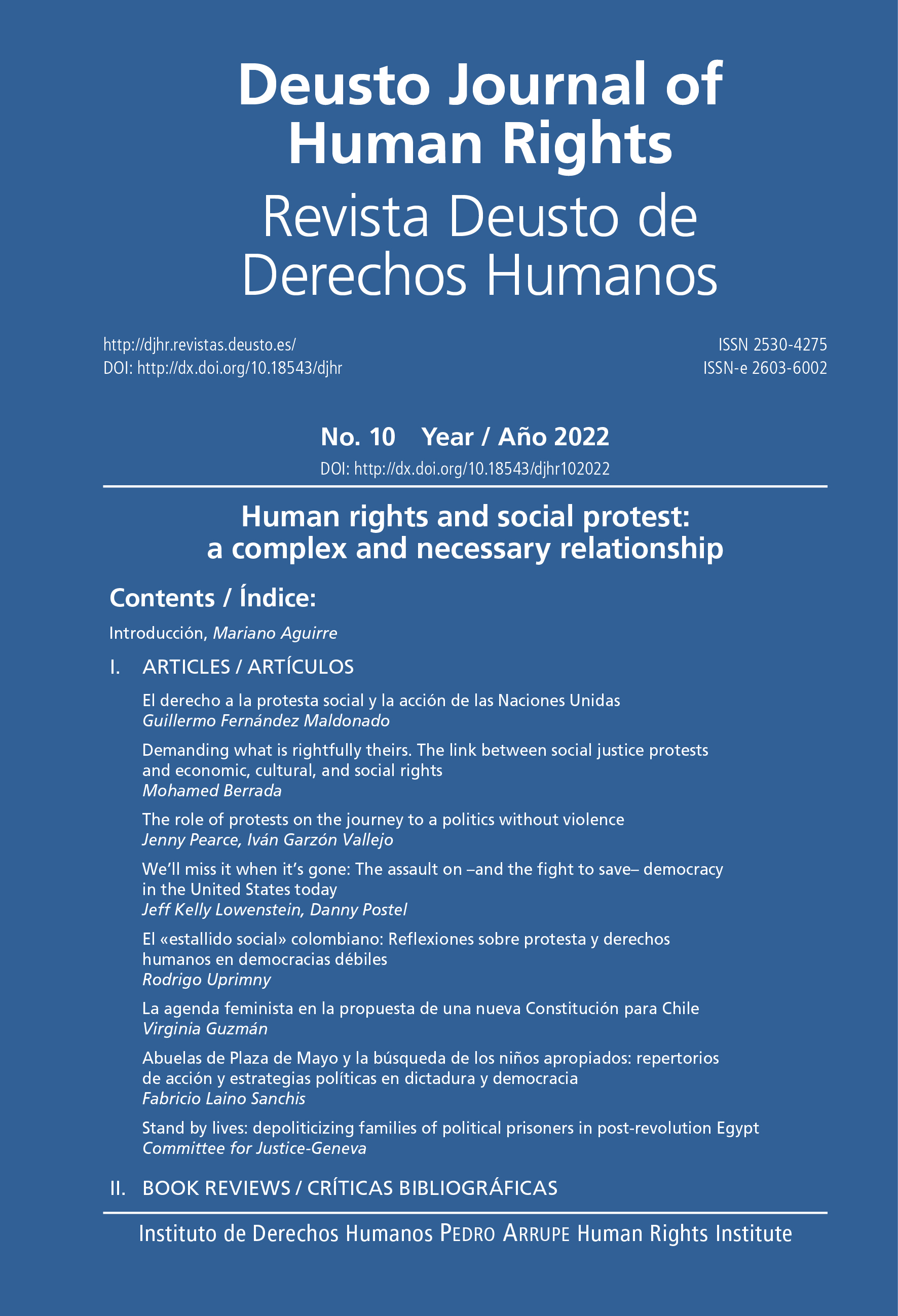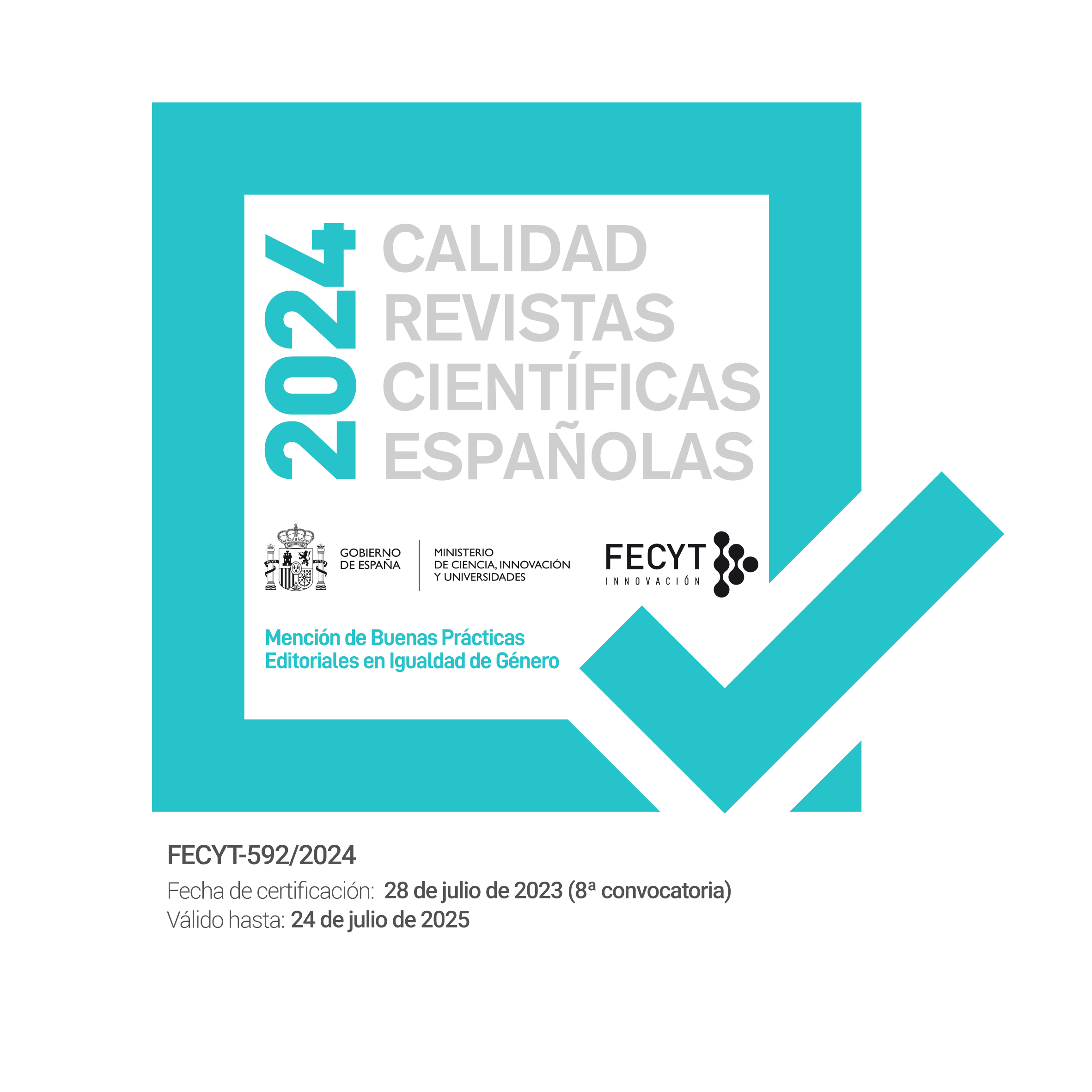En defensa de las vidas: despolitizando a las familias de los presos políticos en el Egipto de la post-revolución
Resumen
Desde 2917, el Comité de Justicia ha estado trabajando en el monitoreo y verificación de violaciones de derechos humanos dentro de las cárceles y lugares de detención egipcios, dentro de su proyecto «Detention Watch». Basado en los resultados de 10 entrevistas en profundidad con familiares de presos políticos mantenidas durante marzo y septiembre de 2022, este artículo presenta los casos de familias que son agentes sociales y económicos activos e inactivos que representan diferentes grupos de la población egipcia. Y se centra en el impacto de las violaciones de derechos humanos en la despolitización de los familiares de los presos políticos –esposas, padres e hijos– y en cómo esto afectó sus esfuerzos para superar las dificultades económicas, así como en sus actitudes con respecto a la migración, la protesta y la reconciliación política con el régimen. Con ello, el artículo trata de explorar los resultados personales, económicos, sociales y políticos de la represión, y cómo esto ha llevado a una mayor despolitización entre las personas que se ven afectadas indirectamente por violaciones de derechos humanos.
Recibido: 20 mayo 2022
Aceptado: 16 noviembre 2022
Descargas
Citas
Abdelrahman, Maha. 2014. Egypt’s Long Revolution: Protest Movements and Uprisings (1st ed.). London: Routledge. https://doi.org/10.4324/9781315762265
Allam, Nermin. 2015. «What Holds Next? The Politics of Disappointment,» The London School of Economics and Political Science Middle East Centre (blog). http://blogs.lse.ac.uk/mec/2015/08/11/what-holds-next-the-politics-of-disappointment/
Allam, Nermin. 2018. «Activism Amid Disappointment: Women’s Groups and the Politics of Hope in Egypt.» Middle East Law and Governance 10, no. 3: 291-316. https://doi.org/10.1163/18763375-01003004
BenEzir G. 2009. «Trauma signals in life stories». In Trauma: Life Stories of Survivors, 29-44. Edited by With Graham, Kim L. Rogers and Selma Leydesdorff. New Brunswick, NJ: Transaction Publishers.
Caracciolo, Giorgio, Ergun Cakal, the Committee for Justice, and Egyptian Commission for Rights and Freedoms. 2021. Torture in Egypt: Systemic and Systematic. Dignity publication series on torture and organised violence, praxis paper 38. Accessed 24 January 2022: https://www.dignity.dk/wp-content/uploads/publication-series-38.pdf
Committee for Justice. 2020a. Slow Death: Violations in Egyptian Places of Detention. Annual report 2019. Accessed 24 January 2022: https://www.cfjustice.org/slow-death/
Committee for Justice. 2020b. The Giulio Regenis of Egypt: Deaths in custody in Egypt since 2013. Accessed 24 January 2022: https://www.cfjustice.org/the-giulio-regenis-of-egypt-deaths-in-custody-in-egypt-since-2013/
Committee for Justice. 2020c. Renewed Arbitrary Detention: Special Report on May/June 2020. Accessed 24 January 2022: https://www.cfjustice.org/renewed-arbitrary-detention/
Committee for Justice. 2021a. How repression in custody intensified in the era of Covid-19: Annual report 2020. Accessed 24 January 2022: https://www.cfjustice.org/annual-report-egypt-in-2020-was-torn-between-intensified-repression-and-the-covid-19-pandemic/
Committee for Justice. 2021b. We decided to close the investigation: biannual report January-June 2021. Accessed 24 January 2022: https://www.cfjustice.org/we-decided-to-close-the-investigation/
Committee for Justice. 2021c. Egypt’s execution frenzy: 2ed quarterly report April-June 2021. Accessed 7 February 2022: https://www.cfjustice.org/egypts-executions-frenzy-continues-in-second-quarter-of-2021/
Committee for Justice. 2022a. Conviction without trial: Trial Watch annual report 2021. Accessed 24 January 2022: https://www.cfjustice.org/conviction-without-trial/
Committee for Justice. 2022b. Egyptian Prisons: rehabilitation centres or graves for human rights. Accessed 7 February 2022: https://www.cfjustice.org/egyptian-prisons-rehabilitation-centres-or-graves-for-human-rights/
Committee for Justice. 2022c. Rawabet we Tajammou’at zawy al-dahaya bi Misr wa kayfa asbahat juz’an fa’ilan men al-hirak al-siyasi [Networks and gatherings of victims’ families in Egypt and how they became an active part of the political and human rights movement.] Accessed 7 February 2022: https://bit.ly/3TmRSst
Department of State. 2021. «Egypt 2021 Human Rights Report.» Country report: Egypt. Accessed 26 January 2022: https://www.state.gov/wp-content/uploads/2022/03/313615_EGYPT-2021-HUMAN-RIGHTS-REPORT.pdf
Durac, Vincent. 2013. «Protest movements and political change: an analysis of the ‘Arab uprisings’ of 2011», Journal of Contemporary African Studies 31, no. 2: 175-193. DOI: https://doi.org/10.1080/02589001.2013.783754
Elsayed, Ahmed, and Olivier Marie. 2019. «Less school (costs), more (female) education? Lessons from Egypt reducting years of compulsory schooling.» IZA Institute of Labor Economics. 1-65. Accessed 7 February 2022: https://docs.iza.org/dp13402.pdf
Ezzat, Ahmed. 2014. «‘You are being watched!’ Egypt’s mass internet surveillance». Mada Masr. Accessed 7 February 2022: http://www.madamasr.com/node/9001
Freedom House Egypt. 2022. «Rights Defender’s Imprisoned Father at Risk». Joint Statement. 16 February. Accessed 7 February 2022: https://freedomhouse.org/article/egypt-rights-defenders-imprisoned-father-risk
Gould, Deborah B. 2009. Moving politics: Emotion and ACT UP’s fight against AIDS. Chicago: University of Chicago Press.
Greenberg, Jessica. 2011. «On the Road to Normal: Negotiating Agency and State Sovereignty in Postsocialist Serbia.» American Anthropologist 113, no. 1: 88-100. Accessed 24 January 2022: http://www.jstor.org/stable/41407378
Greenberg, Jessica. 2014. After the revolution: Youth, democracy, and the politics of disappointment in Serbia. Redwood: Stanford University Press.
Human Rights Watch. 2019. Egypt: Families of Dissidents Targeted: Relatives of Critics Abroad face home raids, Arrests, travel Bans.19 November. Accessed 24 January 2022: https://www.hrw.org/news/2019/11/19/egypt-families-dissidents-targeted
Kienle, Eberhard and Nadine Sika, eds. 2015. The Arab Uprisings: transforming and challenging state power. London: IB Tauris.
Korani, Bahgat and Rabab El-Mahdi, eds. 2012. Arab Spring in Egypt: Revolution and Beyond (A Tahrir Studies Edition). American University in Cairo Press. https://doi.org/10.5743/cairo/9789774165368.001.0001
Matthies-Boon, Vivienne, and Naomi Head. 2018. «Trauma as Counter-Revolutionary Colonisation: Narratives from (Post)Revolutionary Egypt.» Journal of International Political Theory 14, no. 3: 258-79. Accessed 24 January 2022: https://doi.org/10.1177/1755088217748970 .
Meijer, Roel, ed. 2013. Alienation or integration of Arab Youth. Between family, state and street, London: Routledge.
Meringolo, Azzurra. 2015. «The Struggle over the Egyptian Public Sphere», IAI Working Papers 15, no. 04. Accessed 24 January 2022: https://www.iai.it/en/pubblicazioni/struggle-over-egyptian-public-sphere .
Mirshak, Nadim. 2019. «Rethinking resistance under authoritarianism: civil society and non-contentious forms of contestation in post-uprisings Egypt», Social Movement Studies 18, no. 6: 702-719. DOI: https://doi.org/10.1080/14742837.2019.1627865
Nagah, Hussein. 2014. «The Crisis of Egypt’s Youth». Fikra Forum, Accessed 24 January 2022: http://fikraforum.org/?p=6153 .
OHCHR. 2020. Press Briefing Note on Egypt. 3 April. Accessed 24 January 2022: https://www.ohchr.org/en/press-briefing-notes/2020/04/press-briefing-note-egypt
Pearlman, Wendy. 2013. «Emotions and the Microfoundations of the Arab Uprisings.» Perspectives on Politics 11, no. 2: 387-409. DOI: https://doi.org/10.1017/S1537592713001072
Ryan, Louise. 2015. «Friendship-making: Exploring network formations through the narratives of Irish highly qualified migrants in Britain.» Journal of Ethnic and Migration Studies 41, no. 10: 1664-1683.
Rosenzweig, Mark R., and T. Paul Schultz. 1982. «Market opportunities, genetic endowments, and intrafamily resource distribution: Child survival in Rural India.» American Economic Review 72, no. 4: 803-815. Accessed 24 January 2022: http://www.jstor.org/stable/1810018 .
Sika, Nadine. 2016a. «Youth civic and political engagement in Egypt.» Power2Youth, Working paper 18. Accessed 24 January 2022: https://www.academia.edu/28879909/Youth_Civic_and_Political_Engagement_in_Egypt
Sika, Nadine. 2016b. «Ambiguities of student activism, authoritarianism and democratic attitudes: the cases of Egypt and Morocco.» The Journal of North African Studies. DOI: https://doi.org/10.1080/13629387.2016.1229183
Sika, Nadine. 2017. Youth Activism and Contentious Politics in Egypt: Dynamics of Continuity and Change. Cambridge: Cambridge University Press.
Sztompka, Piotr. 2000. «Cultural trauma: The other face of social change.» European Journal of Social Theory 3, no. 4: 449-466. https://doi.org/10.1177/136843100003004004
Tuccio, Michele, Jackline Wahba, and Bachir Hamdouch. 2019. «International migration as a driver of political and social change: evidence from Morocco.» Journal of Population Economy 32: 1171-1203. https://doi.org/10.1007/s00148-019-00734-9
Vairel, Frédéric. 2013. «Protesting in Authoritarian Situations. Egypt and Morocco in Comparative Perspective». In Movements, Mobilization, and Contestation in the Middle East and North Africa, edited by Joel Beinin and Frédéric Vairel, 2nd ed., 33-48. Stanford. Stanford University Press.
Deusto Journal of Human Rights / Revista Deusto de Derechos Humanos es una revista de Acceso Abierto; lo que significa que es de libre acceso en su integridad inmediatamente después de la publicación de cada número. Se permite su lectura, la búsqueda, descarga, distribución y reutilización en cualquier tipo de soporte sólo para fines no comerciales y según lo previsto por la ley; sin la previa autorización de la Editorial (Universidad de Deusto) o la persona autora, siempre que la obra original sea debidamente citada (número, año, páginas y DOI si procede) y cualquier cambio en el original esté claramente indicado. Cualquier otro uso de su contenido en cualquier medio o formato, ahora conocido o desarrollado en el futuro, requiere el permiso previo por escrito de la persona titular de los derechos de autoría.



3.jpg)
3.jpg)
3.jpg)
.jpg)








